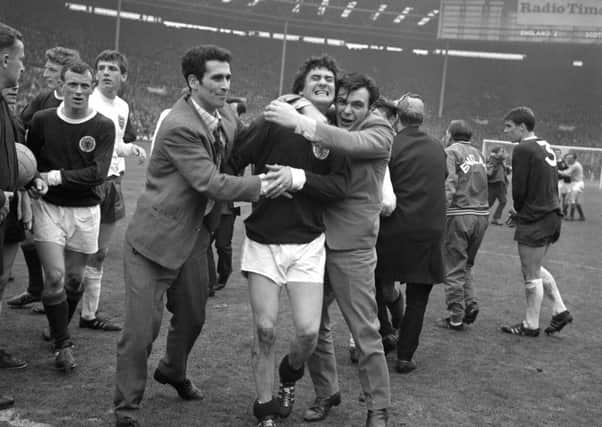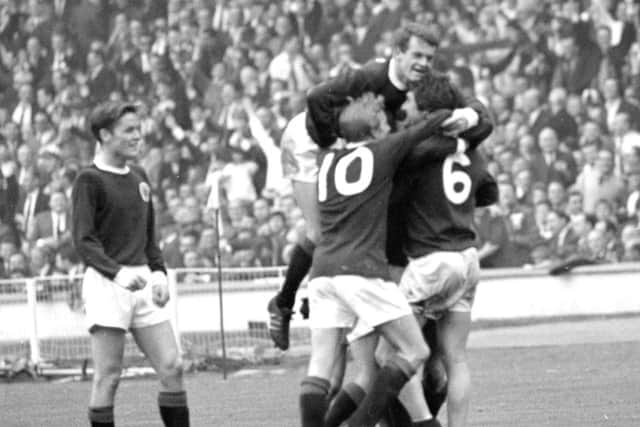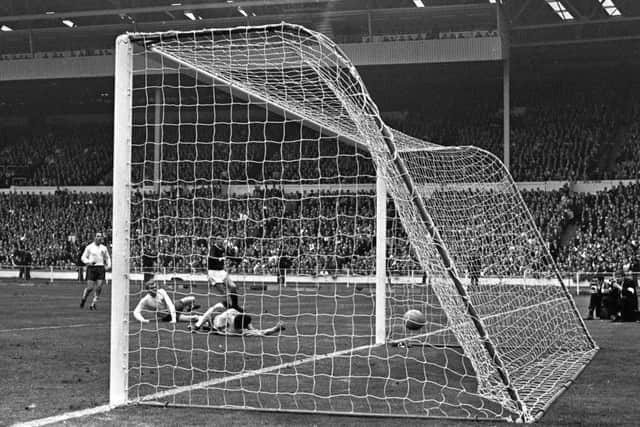WATCH - Bygones: Jim McCalliog's sober celebrations on greatest day for Scottish football


It was a half-a-century ago on April 15, 1967 when the international debutant, then just 20, drunk in every sweet last drop as Scotland dethroned world champions England in a famous 3-2 victory on the hallowed Wembley turf.
Described by Scotland manager Bobby Brown as being the “star turn” – no mean feat in a decorated visiting line-up which contained a stellar cast including messrs Bremner, Baxter, Law and Greig – McCalliog was bestowed with the honour of firing the all-important third goal for the Scots, a life-changing moment for the young man.
Dream debut was the phrase.


Advertisement
Hide AdAdvertisement
Hide AdForegoing the need for alcohol, McCalliog, now 70, can still instantaneously recall memories of that feted Spring day for Tartan football in a golden year for the beautiful game north of the border.
Just over 10 years later, Liverpool manager Paisley neglected to toast his side’s own cherished moment in winning the European Cup for the first time in Rome in May, 1977, with the humble north-easterner preferring to savour the victory and the sense of achievement rather than have his brain befuddled with booze at the after-match party in a hotel in the Eternal City.
It was something that McCalliog can clearly concur with.
Speaking many years later, the Glaswegian, who savoured a magical day with a glass of Coca-Cola as opposed to Champagne, said: “I have a fabulous memory of it all as I didn’t touch a drop of alcohol until I was 23.


“So I remember everything about that experience. It does amaze me that people still come up wanting to talk about it but I am very happy about that.
Advertisement
Hide AdAdvertisement
Hide Ad“The one thing I really wanted in my life was to play for Scotland – that was where I wanted to go. If the ground had swallowed me up at full-time that day, I would have been quite happy because that is all what I wanted to do, play for Scotland.”
As for 1967, it was an exceptional year for Scottish football with Celtic’s feted ‘Lisbon Lions’ going on to lift the European Cup 40 days later when they become the first British team – and side from Northern Europe – to lift the continent’s big footballing prize.
What was perhaps remarkable about the national team’s success in the previous month was that three of the stars of Jock Stein’s decorated Celtic side in Billy McNeill, Bobby Murdoch and Jimmy Johnstone were all missing from the team who overcame the world champions of England in their own backyard.


It was an England team who went into the game as strong favourites with Alf Ramsey’s side boasting a formidable 19-match unbeaten streak, incorporating their magnificent path to glory in the World Cup of 1966.
Advertisement
Hide AdAdvertisement
Hide AdTheir last defeat had arrived in October, 1965 when they lost out to Austria in a friendly, with England fully expected to continue their impressive form of the last 18 months and retain the Home International Championship, having beaten Northern Ireland 2-0 in Belfast before thrashing Wales 5-1 at Wembley in late 1966.
With these fixtures also acting as qualifiers for the European Championships in 1968, further importance was attached to the marquee international fixture in British football, with England featuring just one change to the team that beat West Germany nine months earlier in the World Cup final, with Jimmy Greaves replacing Roger Hunt.
By contrast, recently-appointed Scotland manager Brown, in his first outing as the country’s first full-time boss, rolled the dice, handing debuts to players at the opposite end of the career spectrum in Owls’ midfield tyro McCalliog and veteran Celtic goalkeeper Ronnie Simpson, who became the oldest debutant for Scotland at 36.


The visitors stunned much of the 99,063 crowd by taking the lead midway through the first half through Denis Law – who fired in a rebound after Willie Wallace’s shot had been blocked – and they doubled their lead 12 minutes from time through Bobby Lennox.
Advertisement
Hide AdAdvertisement
Hide AdEngland were hindered by Jack Charlton having to soldier on with a broken toe, with the Leeds United defender forced to hobble around and try and make a nuisance of himself up front with no substitutes allowed.
Eventually, Charlton did pull a goal back but then came McCalliog’s moment.
There was still time for Geoff Hurst to reduce the arrears, but it was the Scots’ day, with the coup de grace arriving with the sight of wonderfully gifted ‘Slim’ Jim Baxter playing an impromptu game on ‘keepie-uppie’ to dance on the footballing grave of the English.
Another part of the Baxter legend from events on the fateful Spring day surfaced on proceedings before kick-off, when reports had it that he was reading the form in the Racing Post 10 minutes before the game.
Advertisement
Hide AdAdvertisement
Hide AdWhen it was suggested that he might want to warm up before such a huge encounter, Baxter is said to first of all have stretched out his left leg and then his right before answering: “That’s me warmed up,” with his gaze still fixed on his newspaper.
Then came his famous ball-juggling antics. Alongside Archie Gemmill’s magical World Cup goal against Holland in Mendoza in Argentina ’78, it represents perhaps the most iconic moment in the history of the Scottish national side.
When the celebrations were over, there was a sad postscript for McCalliog, who had scored at Wembley in the previous year during the Owls’ 3-2 FA Cup loss to Everton, when he put Alan Brown’s side ahead early on.
McCalliog went on to earn just four more caps and took umbrage with Wednesday chiefs for hampering his long-term prospects of wearing the navy blue jersey many more times.
Advertisement
Hide AdAdvertisement
Hide AdHe added: “A few different things happened back then. There was a debate about Anglo-Scots – guys playing south of the border – being in the national team and there always had to be so many Celtic and Rangers players in the team.
“There was a lot of competition about while I had a lot of niggly injuries, too.
“But what annoys me is I was told the SFA thought I didn’t want to play for Scotland. There was nothing further from the truth.
“I found out later that whenever Sheffield Wednesday were asked to release me for international duty they said they would only let me go if I was definitely going to play.
Advertisement
Hide AdAdvertisement
Hide Ad“That was not fair as it came back on me. The SFA must have thought there was no smoke without fire and that I had agreed to that.”
FIVE memorable aspects of the Scots’ 3-2 win
1: England had enjoyed an imperious start to their reign as world champions and were looking to extend a 19-match unbeaten run when they welcomed the Scots to London.
2: This was a golden era for Scottish football. Within six weeks of Bobby Brown’s men winning, four members of the starting XI – goalkeeper Ronnie Simpson, left-back Tommy Gemmell and forwards Willie Wallace and Bobby Lennox – helped Celtic become the first British side to be crowned champions of Europe.
3: Simpson was a late bloomer when it came to international football and was making his Scotland debut at Wembley at the age of 36.
Advertisement
Hide AdAdvertisement
Hide Ad4: England’s hopes suffered setback within the first 15 minutes when defender Jack Charlton suffered a broken toe. Substitutions were still not generally allowed in international competition, meaning Charlton had to limp on up front for the rest of the game. Substitutions were in place for the Mexcio World Cup three years later.
5: If you were not among the 99,063-strong crowd, you will not have seen Scotland’s greatest victory as it unfolded. The match was not deemed important enough to be shown live – only the second half was covered by radio commentators.